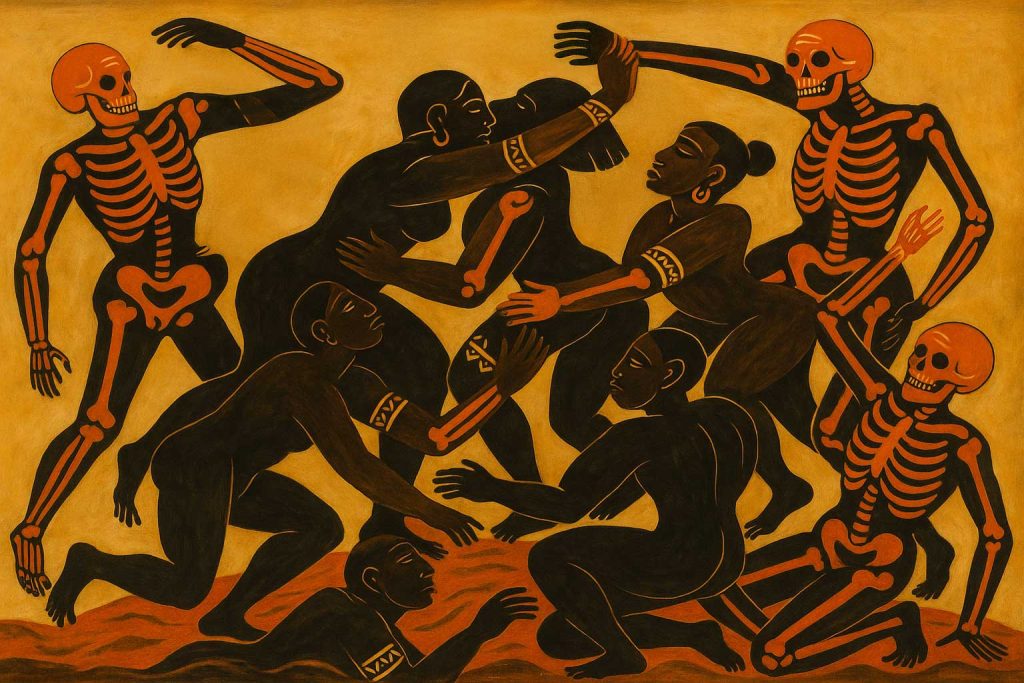In the Shadow of the Returned One
We taste the salt of our own sweat in the air, we who have laboured under this same sun through countless seasons of promise and betrayal. The harmattan winds blow red dust from the north, carrying whispers of our ancestors’ disappointment, settling in the creases of our palms where we once held gold but now count borrowed coins. We are here again, breathing the familiar scent of hope mixed with resignation, watching the baobab trees that have outlived a dozen governments still standing patient while our institutions crumble like termite-eaten wood.
The returned one walks among us now, his footsteps echoing in the same corridors where others before him signed away our tomorrow for today’s bread. His shadow falls across the same documents, the same ledgers where our debt is recorded in foreign currencies that fluctuate like the emotions of distant gods. We have seen this shadow before, felt its coolness across our faces when he governed in the time before this time. Now the shadow returns, longer perhaps, cast by an older man carrying older promises wrapped in newer cloth.

In the markets of our cities, the women who sell tomatoes and plantain feel the weight of inflation in their bones like arthritis, each cedi worth less than yesterday’s memory. Their voices rise and fall with the haggling that has become desperate theatre, buyers and sellers performing their ancient dance while knowing the music has changed, the rhythm now set by interest rates decided in boardrooms where our faces are numbers on spreadsheets, where our hunger is measured in statistical deviations. The young men stand at street corners in the heat, their muscles unused, their minds sharp but idle, watching the traffic that carries others to work they cannot find. Their skin glistens with the perspiration of waiting, their eyes hold the particular emptiness of those who have been told they are the future while being denied any meaningful present. They lean against walls built from cement mixed with loan conditions, their backs pressed against the architecture of dependency.
How many times have we walked barefoot across the hot sand towards those who hold our purse strings? Our soles remember every grain of this desert path to the temple of borrowing, every stone that has cut our feet on the journey to salvation that comes always from outside ourselves. The taste of dust in our mouths has become familiar, the thirst for dignity mixed with the bitter water of conditions and structural adjustments served in cups we did not choose. The cocoa pods hang heavy on branches that know nothing of commodity futures, trees that give their fruit freely while we negotiate percentages of value that will remain in our soil versus what flows to those who transform our raw gifts into finished sweetness. The red earth beneath these trees pulses with oil that once promised liberation but now funds only deeper entanglement. We dig gold from the ground with hands that could craft jewellery but instead ship the ore to factories where others shape beauty and sell it back to us at prices that mock our labour.
The harmattan brings more than dust. It carries the breath of the Sahara, that great desert that speaks of civilisations swallowed by sand, of empires that forgot the source of their strength and withered from within. We taste this warning on our tongues but continue walking towards mirages that shimmer with foreign solutions to indigenous problems. In the government buildings where decisions are made, the air conditioning hums with electricity borrowed against future harvests. The leather chairs creak under the weight of bodies that have forgotten the texture of the earth, hands that sign agreements without feeling the calluses of those who will pay the price. The fluorescent lights buzz overhead like insects, illuminating documents written in the language of creditors, casting harsh shadows that hide the faces of those who will inherit the consequences.
The returned one speaks through loudspeakers that amplify familiar words, promises that echo off concrete walls built with loans that bind our children’s children. His voice carries across markets where vendors count diminished profits, across university campuses where students study theories of development while watching their own nation practise techniques of managed dependency. The sound waves travel through air thick with the exhaust of imported vehicles running on fuel we produce but cannot afford to process ourselves. We have grown old watching the wheel turn, feeling its weight in our joints when the rains come late and the harvest fails, when the currency weakens and our savings evaporate like morning dew. Our skin bears the lines of seasons spent waiting for transformation that arrives always in the rhetoric of politicians but never in the substance of our daily bread. The mirrors in our homes reflect faces that have learnt to smile at promises while our eyes hold the knowledge of repeated disappointment.
The pensioners gather in the shade of neem trees, their white hair catching sunlight as they speak of bonds that vanished in restructuring schemes conceived in offices where no one remembers what it means to work with hands that bleed, to save coins that represent actual labour, actual sweat, actual sacrifice. Their voices carry the tremor of age and betrayal, the particular vibration of those who trusted their government and found themselves collateral damage in negotiations with foreign creditors.
What philosophy can emerge from soil that has been taught to see itself as insufficient? What wisdom can grow in minds that have been trained to seek validation from those who measure our worth in their own currencies? We philosophise about democracy while practising the rituals of economic colonisation, speak of sovereignty while signing away the right to determine our own development path. The rains come and go, filling the same rivers that carried away the profits of our resources, washing the same earth that holds the graves of ancestors who knew abundance before we learnt the arithmetic of scarcity. The water runs red with laterite soil that could support industries we have never imagined, rushing towards oceans where our wealth disappears into global markets we do not control.
At night, when the generators fall silent, and the darkness returns, we are left with the quiet hum of memory and the faint pulse of questions we are still too weary to answer.

